- Written by agriadmin
- Published: 30 Jun 2016
traduire la page
Palm Oil Cote d'Ivoire (Ivory Coast): Palm oil agriculture and production in Côte d'Ivoire
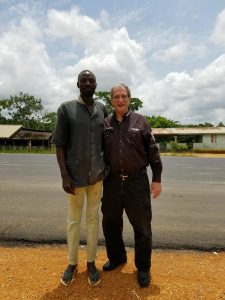
Dogu with AgriSmart founder and Chairman, H. David Meyers. Dogu will head AgriSmart's palm oil farmers collective in Cote d'Ivoire; he has 30 years experience collecting palm oil pods.
A native vegetation of West Africa, oil palms are a highly beneficial organism to the Côte d’Ivoire ecosystem and play a major role in reforestation initiatives. Unlike palm oil production in Malaysia and Indonesia that is destroying habitats and endangering native species, such as the orangutan, the palm oil production process in Côte d'Ivoire employed by AgriSmart uses a sustainable agriculture system called
taungya (
wiki), which is an intercropping between existing trees that optimizes yields, while furthering reforestation, and protecting the habitat of the native species of plants and animals.
Along with consideration of the enactment of
reforestation policy options by the Côte d'Ivoire government, including continued public awareness, mass education about and moral persuasion against deforestation, plus support for large-scale government and private investments in reforestation, a sustainable agriculture
reforestation technology option under consideration is the creation of a buffer zone of intensive agricultural perennials (coffee, cacao, oil palm, and rubber) around or adjacent to the most imminently threatened forest areas.
[9]

H. David Meyers with palm oil workers from the farmers collective partnering with AgriSmart in Côte d'Ivoire
promotes fair labor, paying Côte d'Ivoire farming employees higher than average wages, and continues to develop innovative sustainable use practices at every stage of palm oil production from seed to finished product. AgriSmart embraces the sustainable agriculture initiatives of the
RSPO Roundtable on Sustainable Palm Oil. (
more)
Palm oil is currently one of the fastest growing global agriculture industries, and perhaps the most widely used agricultural commodity today, likely found in products in every room of your house. Common uses of palm oil ranges from soaps and detergents, to mayonnaise, salad dressings, and as a butter substitute
in pastry dough and baked goods, to use in wound care for it's antimicrobial effects, to biomass and bioenergy used in biodiesel. The oil obtained from the nuts is used in cosmetics and to produce a soap considered a remedy for fever and skin conditions (acne, ringworm). Oil palm roots mixed with other medicinal plants are administered as a remedy for swelling.
[10] The organic waste matter can be converted into pellets that can be used as biofuel. Palm oil, after use to fry foods, can be converted into methyl esters for biodiesel use as a sustainable alternative to petroleum diesel.
[3]
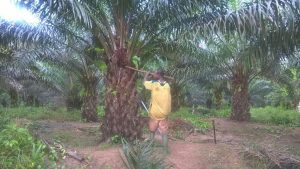
Ivory Coast worker harvesting oil pods
Palm oil has a long shelf life, which makes it ideal for baked goods and as a frying fat in the snack industry.
The growth of palm oil in the U.S. was fueled in part by a 2006 order by the
U.S. Food and Drug Administration to label trans fats in foods, prompting snack companies to look for alternatives.
[5] Almost every major food manufacturer uses palm oil in their products.
[2]
Palm oil is the highest-yielding vegetable oil crop, which makes it very efficient. Oil palms need less than half the land required by other crops to produce the same amount of oil. This makes palm oil the least expensive vegetable oil in the world.
[4]
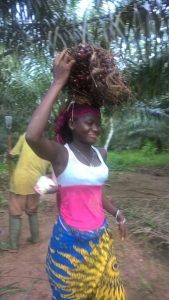
The palm oil industry is a major source of employment in Cote d'Ivoire, producing products and income for millions of people, women in particular, who are involved in the harvesting, processing, and marketing of palm oil, kernels, and wine. [10]
The oil palm is an integral part of Côte d'Ivoire culture. Two Yacouba villages interviewed in Dakouépleu and Douèleu, in the Logoualé sub-prefecture of western Côte d’Ivoire stated that the oil palm is a gift from nature; they say their ancestors were born from God and found that the oil palm had been given to them. For the Gouro people of west and central Côte d’Ivoire, “The oil palm is what Bali, God the creator, gave human beings before putting them on the earth. He gave it to them for food. Human beings and palm trees are one and the same: we are both here on the earth. It watches over us, as God intended. That is why this tree never dies; even under the hottest sun, even in the dry season, it stays green.” In terms of Côte d’Ivoire tribal symbolism,
the palm is the emblem of beauty and goodness, with the feeling of fresh humidity it gives off, it is seen as calm, gentle, and peaceful.
[10]
Palm oil ensures food security because it is a popular food among numerous ethnic groups in the Ivory Coast
[7] and an essential ingredient for preparing many African foods. Palm oil has long been the vegetable oil of choice in Côte d'Ivoire. The average Ivorian consumes about 10 kilos of it per year.
[11] In Côte d'Ivoire traditional cuisine, red palm oil is an ingredient in stews such as wild spinach stew (sauce feuille) and dried or fresh gumbo stew (sauce djumblé, sauce kopé). It is also found in common dishes based on plantains, manioc, or yams: fufu (boiled plantain or yam pounded into a dough), attiéké (fermented manioc) stew, “red” attiéké made from boiled yams, and alloko (fried plantains). Red oil is incorporated into gumbo stews as a condiment, rather than being used to fry meat or fish as refined white palm oil would be, presumably because it gives them a distinctive colour and taste. But in wild spinach stews, red oil may be used to fry the fish or meat. Thus, both variants of these palm oils has numerous specific uses in Côte d'Ivoire cooking.
[10]
Fresh fruits are the typical Ivory Coast dessert, often accompanied by bangui (BAN-kee), a local white palm wine or ginger beer.
[6] Palm trees are prized in Côte d'Ivoire for the wine they produce, which is used in traditional ceremonies across West Africa.
[2] Palm growers can earn a substantial supplemental income producing palm wine. Ivory Coast is the leading palm wine manufacturer in the world.
Palm Wine in the Ivory Coast (
video).
Ivorian cuisine (
more)
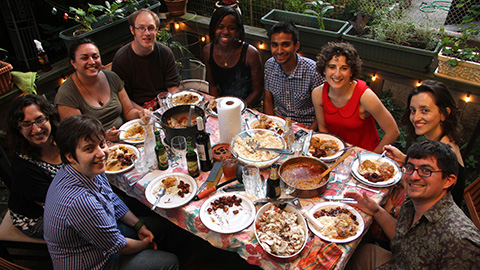
Meal 41: Côte d'Ivoire : United Noshes - One Meal Per UN Member, Afghanistan to Zimbabwe -- Am I getting better at cooking African food, or is Ivorian cuisine just that good? Probably more the latter, but still, this was probably our best sub-Saharan meal yet. The flavors were so well-balanced, the spice delightful and not overwhelming, and the textures pleasant. What’s more, with the exception of a few ingredients that you could probably cleverly work your way around, you can find these ingredients in a standard Western supermarket, so if you’ve been looking to try cooking African food, this is a good start. http://www.unitednoshes.com/2012/meal-41-cote-divoire/
Côte d’Ivoire is the third largest African producer of palm oil
[1],
which greatly contributes to the reduction of poverty through the creation of jobs in an array of industries from plantation farming,
raw production, and manufacturing of finished products, to the transportation and shipping of products at various stages of processing. Ivory Coast is home to Africa's largest oil palm refinery.
The oil palm is the 4th highest income generator in the Ivorian economy.
[8] The National Agricultural
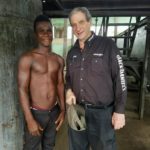
H. David Meyers with a palm oil worker in Côte d'Ivoire
Investment Program in Côte d’Ivoire (Ivory Coast),
PNIA Programme National d'Investissement Agricole (
more), formulated the third Palm Plan of the global strategy of development in the different agricultural sectors. This plan demonstrates the importance of palm oil to the country's economy by the Ivorian Government. The main objective of this national plan is to increase the Ivorian production of crude palm oil to 600,000 tons by 2020.
[7] AgriSmart in public-private partnership with the Côte d'Ivoire government is ramping up to play a key role in the government's palm oil plan to boost the Ivorian economy by producing an estimated annual output of 120 million gallons of crude palm oil by 2022.
[12]
Related links
- AgriSmart #blog H. David Meyers with a Palm Oil Truck in Côte d'Ivoire (more , H David Meyers #tag in AgriSmart #blog)
- AgriSmart, Inc. - Côte d'Ivoire Crude Palm Oil Exporter - Company Profile (more) on EC21, Global B2B Marketplace - Connecting Global Buyers with Manufacturers, Suppliers, Exporters worldwide (more)
- RSPO Roundtable on Sustainable Palm Oil (more)
- PNIA Programme National d'Investissement Agricole - République de Côte d'Ivoire (original page, Google translate version)
- Africa Palm Oil Initiative: balancing economic development with conservation (article)
- Tropical Forest Alliance 2020 | Deforestation-free supply chains & Climate Change (more)
- TFA 2020 - Africa Palm Oil Initiative (more)
References
1.
Palm Oil Production by Country in 1000 MT.
Country Rankings.
IndexMundi. Source:
United States Department of Agriculture. Retrieved 30 June 2016.
2.
a b Ivory Coast hopes to squeeze the profits from palm oil.
World | Africa.
BBC News. Retrieved 30 June 2016.
3.
Processing and Use.
Palm Oil.
Wikipedia. Retrieved 30 June 2016.
4.
Sustainable palm oil.
About Sustainable Palm Oil.
RSPO - Roundtable on Sustainable Palm Oil. Retrieved 30 June 2016.
5.
5 Things to Know About Palm Oil.
World.
The Wall Street Journal.
Dow Jones & Company, Inc.. 26 July 2015. Retrieved 30 June 2016.
6.
Food in Côte d'Ivoire - Ivorian Food, Ivorian Cuisine.
Algeria to France.
Food in Every Country.
Advameg, Inc.. Retrieved 30 June 2016.
7.
a b Palm oil in the Ivorian economy.
Palm oil.
Palmafrique. Retrieved 2 July 2016.
8.
Le palmier à huile (The oil palm).
Importance de la culture (Importance of culture).
Ministère de l’Agriculture - Côte d'Ivoire (Ministry of Agriculture - Ivory Coast). Retrieved 2 July 2016.
9.
Côte d'Ivoire.
Sustainable Agriculture and the Environment in the Humid Tropics.
The National Academies Press.
The National Academies of Sciences, Engineering, and Medicine. Retrieved 2 July 2016.
10.
a b c d Oil palm production in West and Central Africa.
The oil palm sector in Côte d'Ivoire.
GRAIN. 22 September 2014. Retrieved 19 July 2016.
11.
A long history and vast biodiversity.
A love affair with traditional palm oil in Côte d'Ivoire.
GRAIN. 22 September 2014. Retrieved 19 July 2016.
12.
Profit Begins for Impact Investment In Sustainable Development Goals. News Center.
PRWeb. 11 May 2016. Retrieved 19 July 2016.
Follow AgriSmart for up to date sustainable palm oil development news in Cote d'Ivoire (Ivory Coast):
Facebook | Twitter | LinkedIn | Blog
Comments Off on Palm Oil Côte d’Ivoire







